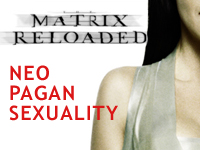The Matrix: Reloaded (Andy & Larry Wachowski, 2003)

Neo-pagan sexuality
The sex scene in The Matrix: Reloaded is lengthy, its impact increased by the pulsating drum score which accompanies it. It was not created to be missed.
Some viewers are surprised by it, though Larry and Andy Wachowski’s earlier (1996) film, Bound should have prepared us for it. It is easy to dismiss the scene as gratuitous, insignificant to the meaning of the film and included merely to pander to the tastes of a movie-going adolescent audience. That strikes me as dubious, however, since surely the Wachowski’s knew the film was so highly anticipated that it did not need sex to entice people to see it. The scene went on far longer than necessary (not the only scene with that flaw), and I suggest that perhaps it has significance for the message of the film.
The Matrix films are religiously postmodern, borrowing elements from Eastern religion, pop spirituality, and Christianity. In The Matrix Reloaded, the Wachowski’s provide us a glimpse of Zion, the last refuge of the human race in the war with the machines. The temple/sex scene is crucial because it is not only in the heart of Zion, it has religious meaning as a final assembly to prepare for the last desperate battle for survival. And notice how it is depicted. The temple gathering begins with a “prayer” followed by a message of hope from Morpheus. Then what begins like a rock concert slowly becomes orgiastic. The film cuts back and forth between the massive crowd gyrating together and Neo and Trinity’s love-making off by themselves. This is Zion’s preparation for war, their ritual of worship and unity. I can’t imagine a more powerfully seductive cinematic image of neo-paganism.
Neo-paganism as a world view involves a reverence for nature, an intimate expression of our connections with nature and with the divinity (male and female) which is immanent within it. Thus neo-pagans desire to be in tune with the seasons, the cycles of life and death within nature. Fertility rites and sacred prostitution were part of pagan worship in the ancient world because it was believed that such rituals made them one with one another and with nature, which aligned human life with the ongoing cycles of the universe and the fertility of the land. Seen in this light, the orgy in the temple in Zion shows the human race doing the one thing that machines can not do, the people celebrating as their savior, Neo, is united to his consort.
As I watched the film, I thought of The Wickerman which depicts the conflict between the paganism of the Druids and Christianity. Here too, sexuality plays an important role.
I am not suggesting that people who see Reloaded will seek to frolic with neo-pagans around bonfires in the woods. Nor that those who are drawn to neo-paganism are morally irresponsible. I would suggest, however, that for every neo-pagan we meet, many more of our neighbors are increasingly seduced by ideas and values that are compatible with a neo-pagan perspective.
The true people of Zion must winsomely counter the misunderstanding that all we believe about sex is “Thou shalt not.” To do that we will have to first regain a biblical view of human sexuality and of its mysterious relationship to the believer’s “union with Christ,” a reality which will be consummated when our divine Bridegroom returns.

